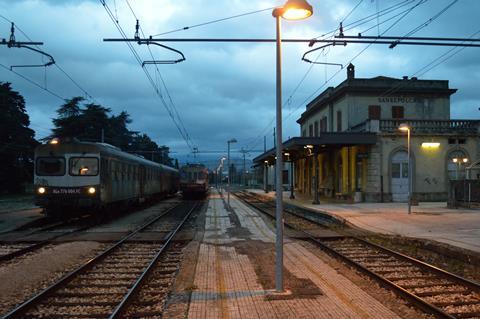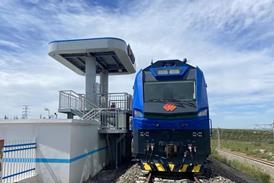
ITALY: The replacement of diesel trains with hydrogen on a line in central Italy is being studied by AECOM, Spanish renewables group Iberdrola, green hydrogen firm Cinque International and sustainable development specialist Ancitel Energia & Ambiente.
The companies have signed a memorandum of understanding covering four projects to support sustainable economic recovery in the region, which was badly affected by earthquakes in 2009, 2016 amd 2017 and has suffered from decades of depopulation.
Apennine line
The first scheme covered by the proposals is the refurbishment of the 300 km Apennine line from Sansepolcro to Sulmona. Part of the line is unelectrified, and the programme aims to replace the current life-expired diesel trains with hydrogen fuelled vehicles.
Iberdrola said a switch to green hydrogen would be ‘a drastically less expensive alternative’ to electrification, and would bring innovation and development to areas affected by depopulation and deindustrialisation.
A proposal was submitted to the Hydrogen Bureau at the Ministry of Economic Development in 2019. In 2020 a preliminary viability study was organised by the Scuola Superiore S Anna in Pisa, and a technical bureau was set up in the Ministry of Economic Development in collaboration with the Ministry of Infrastructure & Transport, national operator FS Group and infrastructure manager RFI. In December 2020 efforts began to gather support from local communities and eliminate what Iberdrola called ‘bureaucratic and administrative red tape’.
In July this year the European Commission pre-selected the project for support from European Clean Hydrogen Alliance, which aims to build a pipeline of viable investment projects and scale up the deployment of green hydrogen in Europe.
Two Seas Railway
The companies will also carry out pre-feasibility studies for hydrogen operation on the long-proposed Two Seas Railway.
This would cross Italy from west to east, connecting Roma’s Fiumicino airport with San Benedetto del Tronto via Rieti, Amatrice and Ascoli Picen.
Building back sustainably
A third project will assess the potential for diffused green hydrogen manufacturing activity in the region, and a fourth will look at ways to apply new energy and environmental technologies in post-earthquake reconstruction.
‘Our work to develop these new energy projects will support the European Union’s net-zero carbon targets’, said AECOM CEO Troy Rudd on September 22.
‘It will also drive innovation in our industry and attract people and business back to this isolated, inland area of Italy that has been impacted by seismic events in recent years.
‘The aim of this ambitious project is to find ways to build back sustainably, using new energy technology to create job opportunities and boost economic growth for communities in the region.’

















